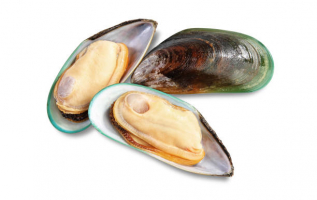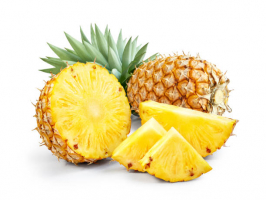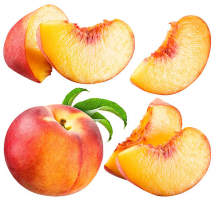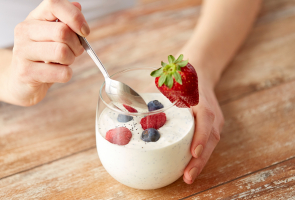Top 10 Health Benefits of Eating Watermelon
Watermelon is a summertime classic, appearing at pool parties and summer barbecues throughout the season. While it's well-known for its capacity to keep you ... read more...cool and hydrated, there is a slew of lesser-known health benefits linked with this delicious fruit. What are the advantages of consuming watermelon? Read on for more information.
-
Watermelon eating has been associated with decreased inflammation and increased antioxidant capacity in animal studies. Lycopene, one of the carotenoids abundant in this fruit, has powerful antioxidant capabilities and can aid in the reduction of oxidative stress. According to the current study, it may also help keep your heart healthy, as well as protect against some forms of cancer, cardiovascular illnesses, diabetes, and macular diseases.
Eating it has also been shown in studies to raise levels of arginine, a key amino acid involved in the creation of nitric oxide. Nitric oxide not only helps widen your arteries to keep blood flowing properly and reduces the risk of high blood pressure, but it also plays a role in immune system regulation. This fruit is also high in vitamin C, a crucial element that acts as an antioxidant as well as an immune booster to keep your body healthy. Antioxidants can aid in the battle against free radicals and protect cells from oxidative damage and stress.
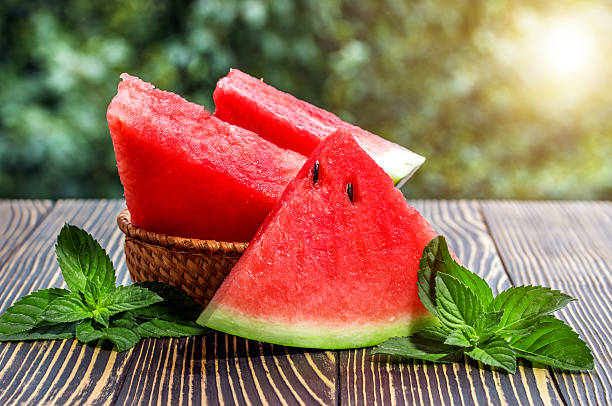
Can Help Support Immunity 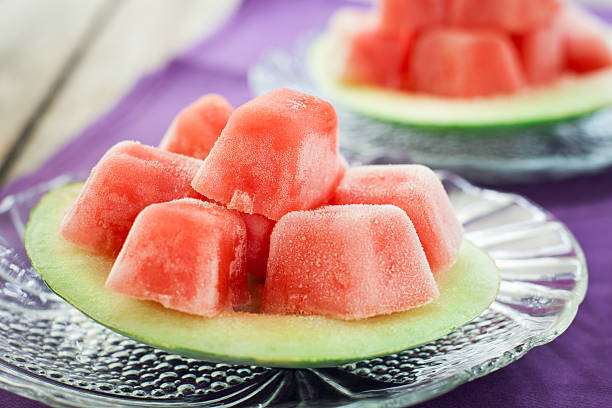
Can Help Support Immunity -
Watermelon is abundant in potassium and magnesium, two vital minerals that can help treat illnesses like high blood pressure. Consuming enough quantities of potassium and magnesium from a nutritious diet appears to be connected with enhanced heart health and a lower risk of mortality from heart disease, according to a study. According to a review published in the journal Advances in Nutrition, consuming enough potassium-rich foods like fruits and vegetables might improve blood pressure levels, which may help reduce the risk of illnesses like stroke and heart attacks.
According to new research, which includes findings from a 2019 study, drinking 100% watermelon juice is "a pleasant, effective approach of raising serum lycopene in older adult women, a group at risk for poor carotenoid consumption". Watermelon's advantages may also include reducing arterial stiffness, balancing cholesterol, and improving systolic blood pressure in persons with hypertension, according to research.
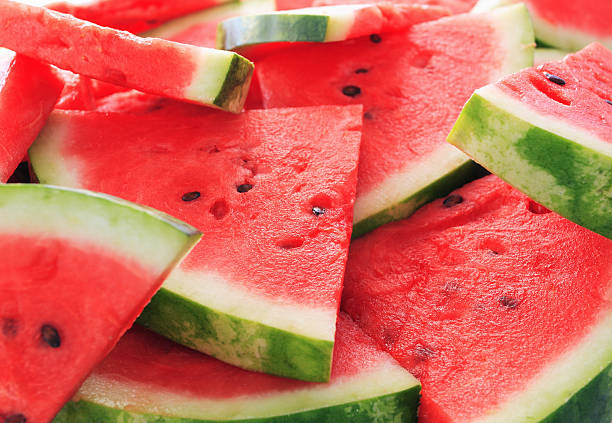
May Improve Heart Health 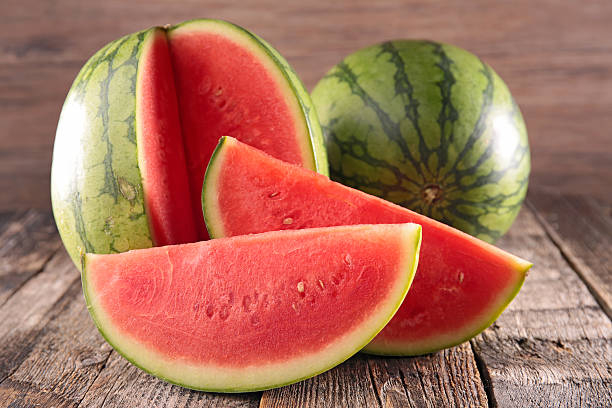
May Improve Heart Health -
It is critical to be hydrated in order for your body to function correctly. Only a few of the biological functions that rely on appropriate hydration are body temperature regulation, normal organ function, nutrition delivery to cells, and attentiveness. Eating meals high in water content may assist provide your body with the water it requires to function correctly. Watermelon contains 92 percent water, making it an excellent choice for daily water consumption.
Furthermore, because of its high water content, this melon has a low-calorie density – that is, it has relatively few calories per unit weight. Eating foods with low-calorie density, such as watermelon, may help with weight loss by keeping you fuller for longer. Watermelon's high water content may help you stay hydrated, which is good for your overall health.
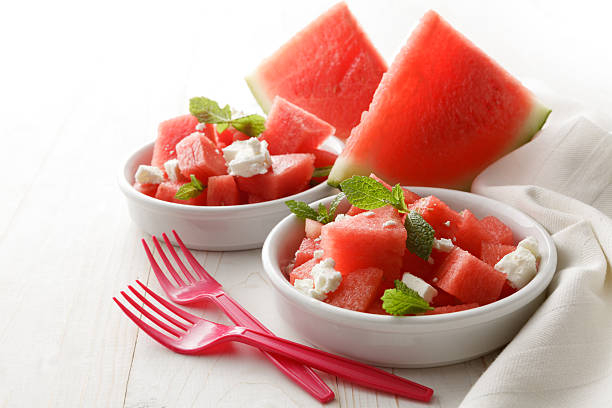
Help You Stay Hydrated 
Help You Stay Hydrated -
Watermelon is rich in minerals such as potassium, magnesium, and vitamins A and C. It's also low in calories, with only 46 calories per cup (152 grams).
Here are the nutrients in 1 cup (152 grams) of raw, diced watermelon:
- Calories: 46
- Carbs: 11.5 grams
- Fiber: 0.6 grams
- Sugar: 9.4 grams
- Protein: 0.9 grams
- Fat: 0.2 grams
- Vitamin A: 5% of the Daily Value (DV)
- Vitamin C: 14% of the DV
- Potassium: 4% of the DV
- Magnesium: 4% of the DV
Watermelon is also high in citrulline, an amino acid that may increase athletic performance. It also contains antioxidants such as vitamin C, carotenoids, lycopene, and cucurbitacin E. These substances aid in the fight against free radicals, which are unstable molecules that may harm your cells if they build up in your body. This damage may eventually lead to illnesses such as diabetes, heart disease, and cancer.
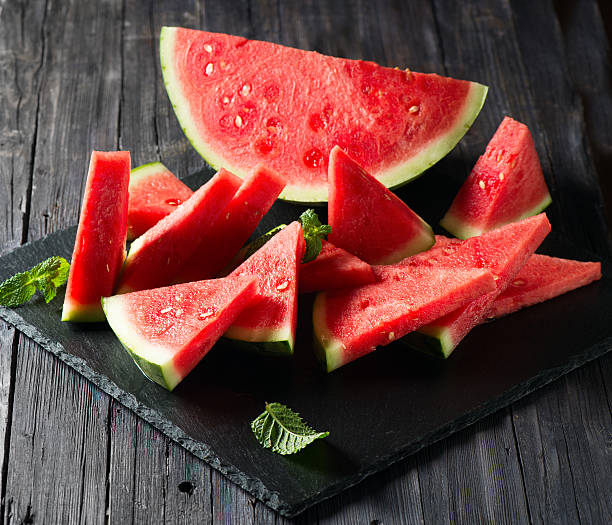
Pack with Nutrients and Benefit Plant Compounds 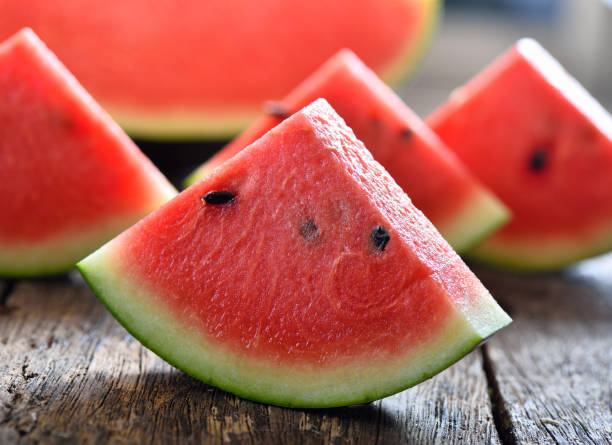
Pack with Nutrients and Benefit Plant Compounds -
This fruit has the potential to be a powerful cancer-fighting meal, packing a hefty amount of antioxidants and watermelon health benefits into each serving. One notable advantage of watermelon for males is that lycopene, one of the fruit's key carotenoids, has been associated with a decreased risk of prostate cancer in several studies. Lycopene also helps to maintain cell membranes robust so that they can defend themselves against toxins that might cause cell death or mutation, according to research.
It's also a good source of the antioxidants vitamin C and vitamin A, which help combat free radical damage and prevent DNA mutation, hence preventing the creation of malignant cells. High dosages of vitamin C have also been proven in studies to improve the cancer-fighting effectiveness of some chemotherapy medications while also lowering the negative side effects of standard cancer therapies.
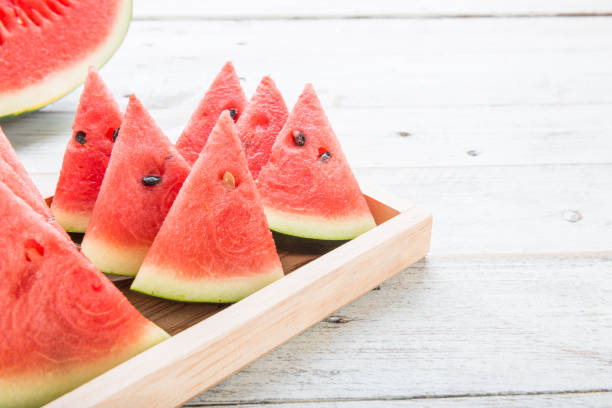
May have anticancer effects 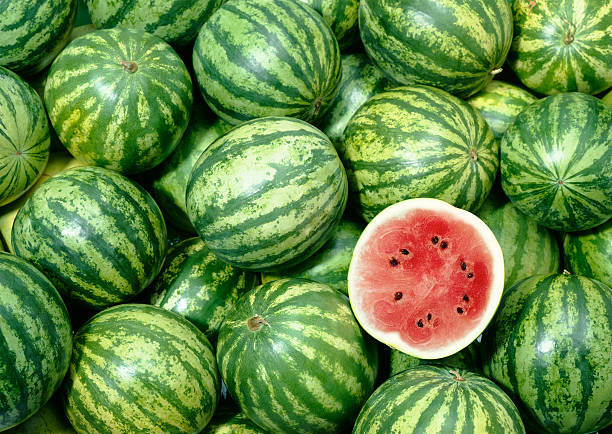
May have anticancer effects -
Inflammation is a major contributor to the development of many chronic illnesses. Watermelon's antioxidants, lycopene, and vitamin C content may aid reduce inflammation and oxidative damage. In one study, rats fed watermelon powder to supplement an unhealthy diet had lower levels of oxidative stress and the inflammatory marker C-reactive protein than the control group. In addition, 8-week research delivered 500 mg of vitamin C twice daily to 31 adults with obesity and elevated inflammatory markers. When compared to the control group, they had a substantial drop in inflammatory markers.
In addition to the possible advantages of watermelon juice, each serving contains a substantial quantity of vitamin C. Vitamin C has been demonstrated to preserve cartilage and bones, aid in tendons and ligament regeneration, and hasten wound healing. Potassium and magnesium, both of which are contained in this variety of melon, are essential for muscle repair and pain alleviation. Potassium, in particular, helps to minimize muscular cramps after activity and to heal from injuries more rapidly.

May reduce inflammation and oxidative stress 
May reduce inflammation and oxidative stress -
Watermelon's high water content is one of its primary advantages. It is thought to be constituted of around 91 percent water, which can aid in detoxification and help rid the body of excess water and fluids, alleviating painful bloating and swelling. Detoxification also requires potassium and magnesium.
Potassium functions as an electrolyte and improves circulatory health, as well as assisting in the management of blood flow and hydration levels inside the body, allowing oxygen to reach your cells. At the same time, magnesium lowers water retention in the stomach, which helps you shed water weight and avoid bloating.
Another intriguing discovery from recent animal research is that drinking watermelon juice reduces fasting blood glucose levels considerably in diabetic mice models. The juice appears to alter the composition of the gut microbiota, which may have beneficial metabolic consequences.
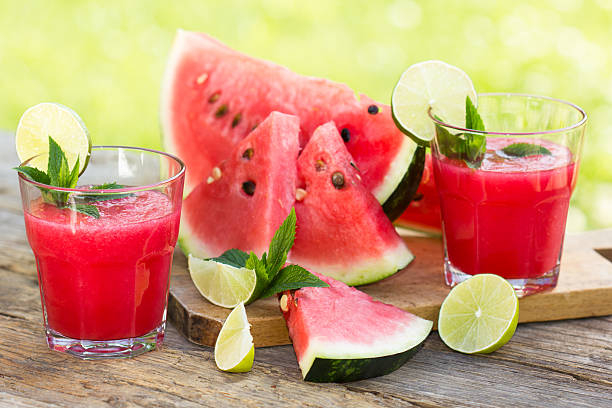
Aid in Digestion and Detoxification 
Aid in Digestion and Detoxification -
Watermelon is beneficial to skin health since it is high in antioxidants. Watermelon's advantages for skin include its capacity to prevent cells from harm and combat free radical generation to slow aging and keep your skin looking healthy due to its high amount of antioxidant vitamins A and C. Vitamin C is extremely beneficial to skin health. It promotes collagen development while also protecting against UV damage. Meanwhile, vitamin A is essential for maintaining cell health and defending against UV damage.
Watermelon's vitamins A, B6, and C keep your skin soft, smooth, and elastic. Melon also makes an excellent face mask due to its high water content. 1 tablespoon watermelon juice plus 1 tablespoon Greek yogurt Apply to your face and let on for 10 minutes to remove any dry, dull skin. Rinse well and pat dry.
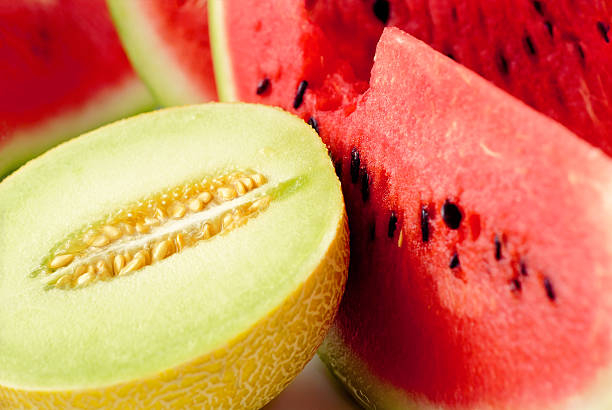
Help Protect Skin Health 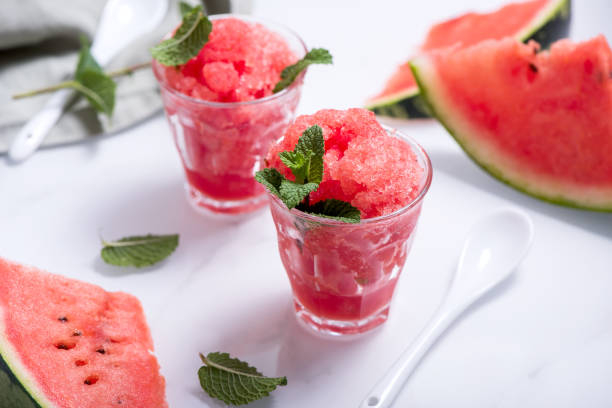
Help Protect Skin Health -
This huge fruit also contains important elements that maintain eye health, such as beta-carotene, vitamin A, vitamin C, lutein, and zeaxanthin, and is one of the numerous advantages of watermelon. A severe vitamin A shortage, for example, has been linked to macular degeneration, a disorder characterized by a corneal thickness that can eventually lead to blindness.
This midsummer fruit is high in beta-carotene, which is a kind of vitamin A found in plants. Consuming enough beta-carotene can help prevent macular degeneration, the major cause of age-related blindness. Just one medium slice of watermelon gives you contains 9-11% of the vitamin A you need each day. This nutrient is one of the keys to keeping your eyes healthy. Foods are the best ways to get all the vitamins and minerals that your body needs.
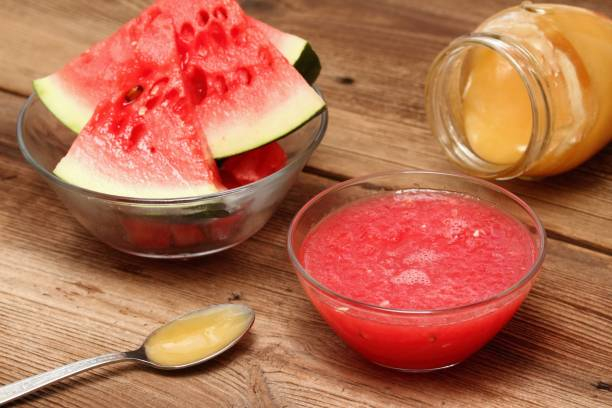
Support Healthy Vision 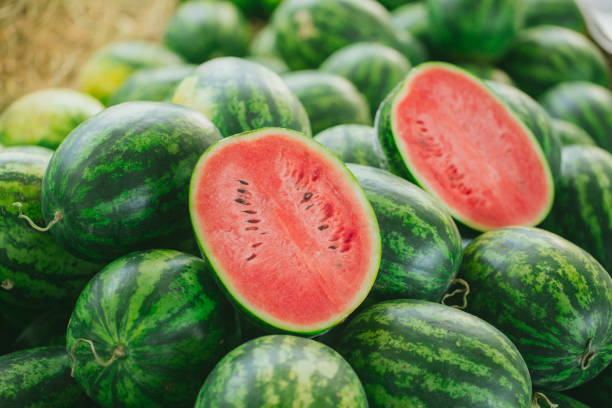
Support Healthy Vision -
Is watermelon useful for weight loss? While it contains natural sugar and carbohydrates, this isn't always a negative thing depending on your diet and how much you consume. Watermelon has a low-calorie count yet is high in a variety of key vitamins and minerals, making it an excellent complement to a healthy weight reduction diet. As a result, watermelon aids weight reduction by increasing fullness and decreasing cravings, keeping you on track toward your health objectives.
A 2019 study published in Nutrients discovered that watermelon eating may help body weight control by improving satiety (fullness) and postprandial glucose and insulin response. After four weeks of intervention, eating two cups of watermelon instead of cookies resulted in a significantly higher satiety response (lower hunger, prospective food consumption, desire to eat, and greater fullness), as well as significantly lower body weight, BMI, systolic blood pressure, and waist-to-hip ratio.

May Help With Weight Loss 
May Help With Weight Loss














